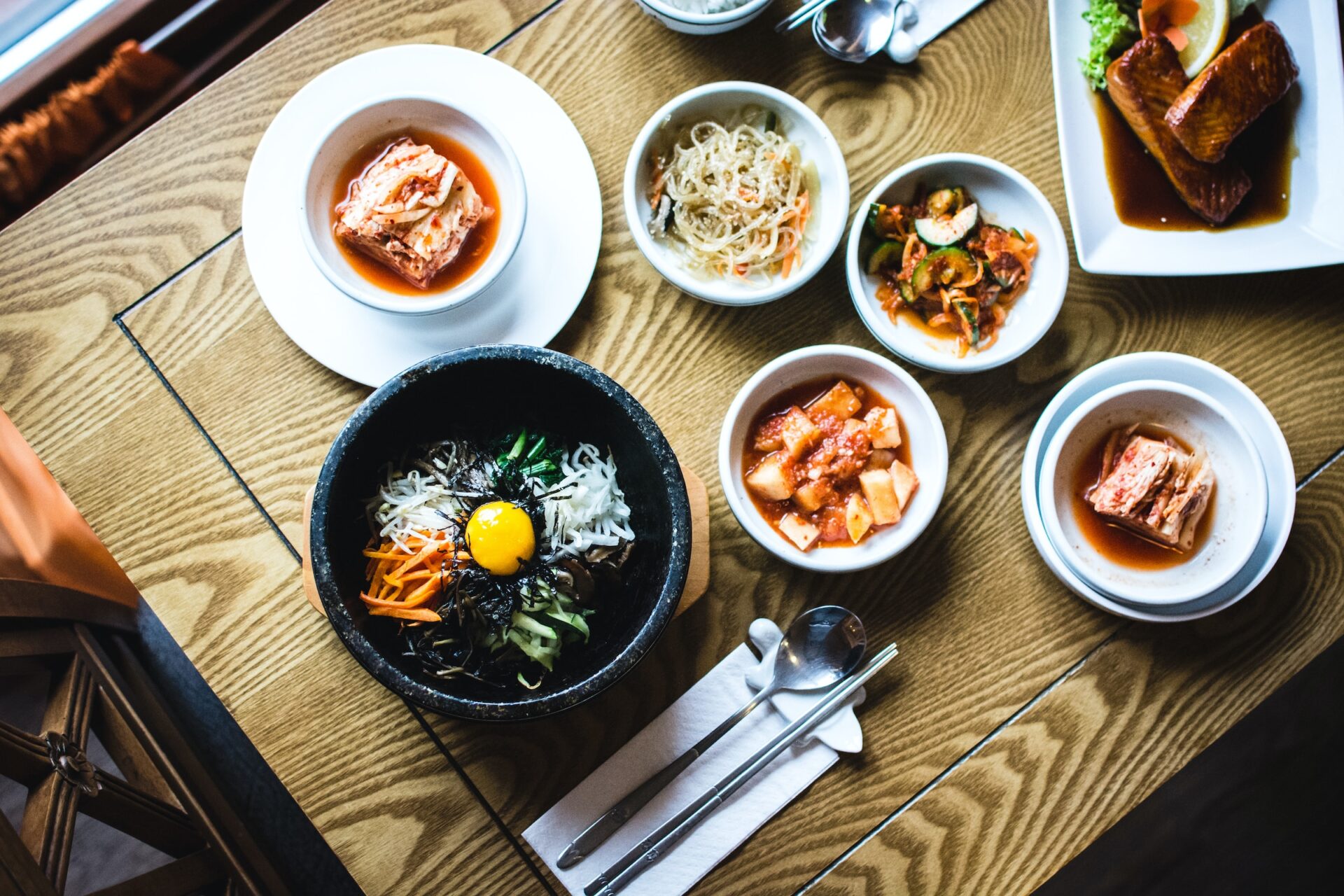On its most basic level, food fuels our survival. It feeds culture, builds community, and connects us to family. Food is a universal blessing, a gift, and a means of communication. Growing, collecting, and preparing food can empower and enlighten, evoking memories of warm, happy times. But food can also be weaponized — withheld, manipulated, or poisoned. Eaten in times of danger or under duress, food can dredge up painful memories, and it is true that sometimes food tastes like war.
In Grace M. Cho’s 2021 memoir “Tastes Like War,” she uses food to examine her past, in particular her relationship with her mother, a Korean woman born in Japan during World War II in an era when Korean forced laborers lived in the nation of their colonizer.
In the 1960s, Cho’s mother worked in a “camptown” outside a US naval base in South Korea, where she met her father, a US merchant marine. Before her second birthday, Cho, her older brother, and mother immigrated to her father’s conservative hometown in rural Washington State where they were among the only non-white residents.
Growing up biracial in the 1970s, Cho was viewed as the “other” — an outsider in the United States, an outcast in Korea. Her memoir unravels a complex web of forces that transformed her mother from a self-possessed, resourceful parent determined to help her daughter achieve the education she herself was denied to a person gradually beset by fear, paranoia, and eventually schizophrenia.
Throughout her struggles, Cho’s mother supported her family and other immigrants by embracing Korean food customs and adopting those of the United States by foraging, cooking, and preserving food memories.
“Tastes Like War” is a bold, often painfully honest account of race, gender, and militarism. It’s the story of reckoning with identity and culture forged in the shadow of colonialism and scarred by racism and the stigmatization of mental illness.
It’s also the story of Cho’s relationship with her family — in particular her mother — and the joy and comfort that comes from overcoming vulnerabilities, understanding the pain of others, and building loving relationships based on compassion, honesty, and yes, food.
Jon Letman spoke with Cho about her book below.
Your book examines complicated subjects — colonialism, mental health, sexual exploitation, racism, and the generational impacts of militarism — and yet it’s filled with joy, warmth, and humanity. What was your aim in writing this memoir?
My mother suddenly died at the age of 66 of an unknown cause. It was so devastating that writing was a way of processing memories and questions that came up in the wake of her death. In my grief, I recovered those memories and started writing them down so I wouldn’t forget them. This new story emerged for me about who my mother was and what my relationship was to her. Initially, I was only writing the happier, joyful memories and the memories of food. I set out to write a food memoir, but as I was working, I started to add in the layers of colonial history, US imperialism, xenophobia, and all the things that broke her down to create the mother of my adolescence who was extremely paranoid and had a lot of psychic pain.
You write about the relationship between your Korean mother and your American father and the lingering questions you had about how they met outside a US naval base in Busan. You explore the nature of their early relationship and how it evolved. This brings up the question of “camptown” culture outside US military bases, of coerced sex work, and the uneven nature of international relationships in a militarized environment.
As you read in the book, it was kept secret from me until right before I was about to turn 23. I was the only person in my family who didn’t know about it. So that was a traumatic experience for me to process… to take in all I had learned that my mom had been a sex worker for US personnel in South Korea.
Retrospectively, I started to see that the power imbalance between my parents was sort of an effect of that larger geopolitical relationship—that my mother was very isolated in the town where I grew up. It was my father’s hometown. He was well-respected as a native of that town, as a white man. My mom was always considered the foreigner.
One conversation I had with my mom was really surprising to me because I was really afraid of what she would think of my writing something related to her past, and she was very supportive of it. I understood that to mean that she was ready to let go of that shame and move forward.
A major theme in your book is the causes and effects of schizophrenia on your mother and, by extension, the rest of your family. Today mental health is in the news daily and has become a common topic of discussion, but it wasn’t like that in the 1970s and 80s, right? You wrote that at that time, the closest term for mental illness in Korean was something like a “pained spirit.”
I think the clinical language does exist in Korea, but it’s not in common use. I was advised by Korean friends that the way I should put it was that “her spirit hurt.” That in itself was really interesting, and I’ve continued to think about how here in the US, we think of mental illness as a disease of the brain, like a chemical imbalance, whereas from a Korean cultural perspective, it is an illness of the spirit.
“Tastes Like War” is a bold story of Cho’s relationship with her family, particularly her mother, and the comfort that comes from understanding the pain of others and building loving relationships based on compassion, honesty, and yes, food.
I think one of the problems with our mental healthcare system is that we don’t broaden that perspective enough to think about spiritual, social, even psychological. So much of mental healthcare in the US gets reduced to drug treatment. I do think things have changed. As you said, people are much more open about talking about their diagnosis, but I think the stigma for people that have been diagnosed with schizophrenia or any kind of psychosis remains. That group of people continues to be some of the most marginalized in our society.
You wrote that when she did start to get treatment, she was getting medication, but it was as if she swapped out schizophrenia for a new different illness.
When we think about voices, especially when I was growing up and my mom first started seeing a psychiatrist, the conventional wisdom about those voices — and I think this is still dominant today — is that they are just a symptom of schizophrenia, they don’t necessarily mean anything. The goal is to make them disappear with medication, whereas there are other approaches that don’t treat voices that way. The voices come from some place. They might be a remnant of trauma. It might be the voice of someone who had been abusive in the past. In the case of my mom, sometimes the voices would say things about a family history or Korean history that were clues for me to investigate. I think that there’s something to be gained from thinking about those voices as part of the person and their life history.
Another central subject of your book is race, racism, and your reflections on growing up as a biracial girl in a small rural town in western Washington State in the 70s and 80s. How was your experience different from what biracial kids in America may experience today?
I don’t know how easily I can generalize because I grew up in a place that was so specifically non-diverse. I don’t think that community has changed a whole lot since I left. It’s still majority white. The number of people of color have grown but only a little bit. I don’t know that I can compare it to the experience of my students now because I live and teach in New York City, where there’s a totally different racial landscape, and the majority of even my white students are very aware that racism is deeply embedded in our society and needs to be rooted out.
Of course, we’re seeing this huge surge in anti-Asian violence over the last couple of years. When you’re confronting racism, I don’t know how relevant it is to be biracial. My experience growing up was that it didn’t matter that I had a white American father. I was still seen as an Asian, as a foreigner.
I think we have made a lot of progress thinking about race and racism since the 70s and 80s, but because racism is so deeply embedded in our society — it’s what America is built upon, essentially — that until we recognize that and can remedy it, it’s going to keep coming back depending on the political climate [and] the specific cultural context so we can’t really think about progress in a straight line.
The title of your book, “Tastes like War,” was something your mother said to express her distaste for powdered milk. Can you talk about the meaning of this phrase?
The meaning of her rejection of powdered milk was that it brought back this trauma from the war. It was like there is an underlying rationale for these small things that she did that can easily just be dismissed as a symptom of schizophrenia, but I wrote about how I saw those things as little acts of resistance from her. Ways of her rejecting larger power structures in whatever limited capacity she had.
The book’s title is very striking and really resonates, I think.
In food memoirs, usually, the association is with pleasant memories, the warm, fuzzy nurturing memories of your mother, your grandmother. That’s such a common trope, so I also wanted to explore the other side of that when the taste of something brings you back to a place where you think that you might not survive.
But on the other hand, you write about how food empowers your mother — when she is foraging at the beach for fish and seaweed and in the forest collecting fiddlehead ferns, mushrooms, and berries. And she turns this into a cottage industry while feeding her family.
That was the time in her life that I identify as her high point because she had such tremendous capacity. The quantity of food that she foraged and cooked was really incredible, and she made a pretty good income from it too. I think she took a lot of pride in it. One of the observations I made in the book was how she was able to relate to this community that, in many ways, had rejected her by feeding them — to be in this magnanimous position of being the one to take care of these people who didn’t always take care of her.
You also describe the parties she hosted for your teachers, where she prepared a wonderful spread of dishes with Korean food and drinks, and how those gatherings became quite popular.
Right. She knew how to use food as a kind of political advantage. She did not have a lot of formal education, but she knew that if she could invite people into her home and welcome them with a party and food, they would remember me, and they would remember us. It was building a relationship that was going to provide an advantage for her own family.
“Tastes Like War: A Memoir” is published by The Feminist Press. A Korean translation will be published by Geulhangari in June 2023.





















